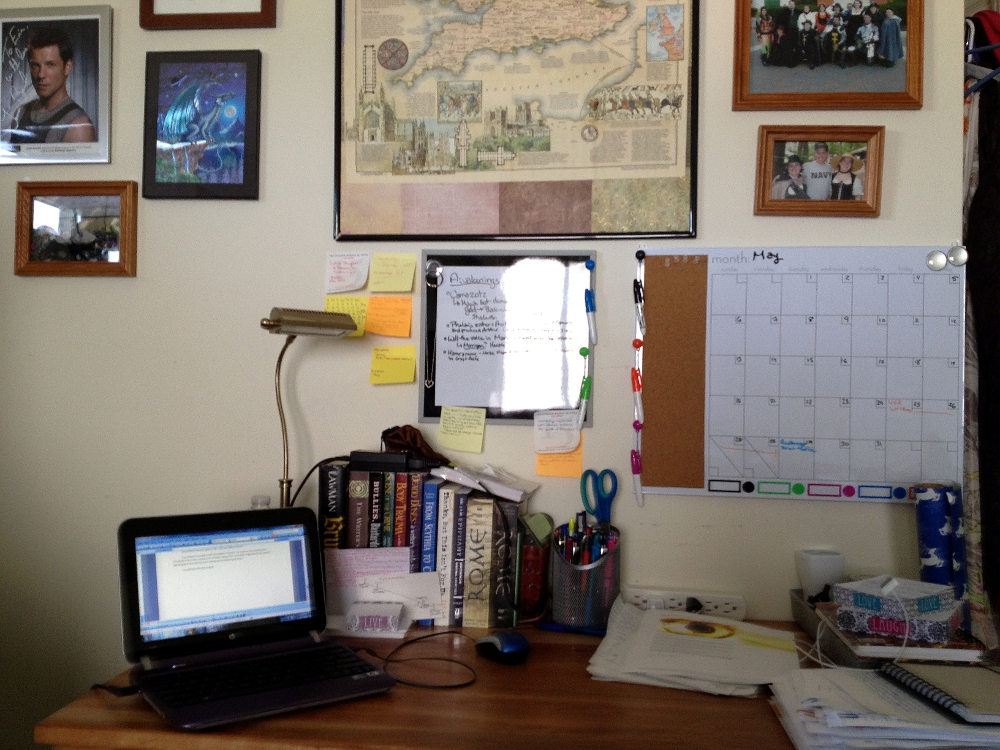Everyone has a different process for writing, but at the end of the day, we all need a place to write. I can’t tell you how many books on writing have told me that you should have a dedicated space to work–a spot that will put you undoubtedly in the mindset for writing from the moment you sit down to work.
Pardon my language, but it’s a load of bull.
Yeah, it’s wonderful to have a spot that you can retreat to when everything else in your life is going insane, but it’s not something that’s strictly necessary for the writing process. I’m not even sure it’s something that would be helpful for most writers. Most of us, however, don’t have the luxury of that kind of space. Everything in our lives has to be multifunctional in today’s world–one trick wonders don’t cut it anymore.
Besides, in the days of laptops, netbooks, and tablet PCs, you can go and write anywhere. The folks who follow me on Twitter know that Starbucks and Panera Bread are two of my favorite places to go work–in part because of the change in scenery and in part because I’m not at home. Of course there’s the slight inconvinence of possibly not having all the notes or drafts you need at hand to work through particularly sticky spots, but for writing hard and writing fast, throwing caution to the wind, a public place with a caffinated beverage and an iPod stuffed full of tunes can’t be beat. I wrote many an Awakenings update at Panera or at Starbucks.
Of course, I’ve written an equal amount at my kitchen table and at my desk at home.
Yes, I have a desk–a semi-dedicated workspace. Of course, occasionally that desk serves as a catch-all when I come home from work, or as my craft table, or as a dozen other things. Is it my workspace? Of course it is.
It’s a wonderful desk, custom-built for me by my father, a cut-down version of a library table with shelves on either side and a drawer beneath. When he was first getting ready to build it, he couldn’t imagine me needing a desk as large as what his original blueprints, the original plans called for. In hindsight, I think we both realize that perhaps I could have used the extra tablespace–if only to catch more stacks of paper.
But it’s a wonderful, beautiful desk and I love it.
But I didn’t use it very much until January 2011, when I began the frentic tail end of my master’s program and had exactly six weeks to write, revise, and complete my Master’s thesis.
Since then, I’m constantly finding myself retreating to my desk on Saturday afternoons and weekday evenings–any time there is too much noise going on elsewhere in the house and I don’t feel like actually relocating. The main attraction of havin the desk to work at is the fact that I can stick post-its on the wall in front of me, rifle through file folders of articles and old drafts or my back isses of Writer’s Digest, The Writer, and other writing mags, and get snuggled by my cat (the cat, however, can also be a disadvantage because she has an annoying habit of walking on my desk, especially when I’m trying to handwrite anything).
Everything I need is in one spot, except for maybe a microwave and a coffeemaker, but those are within easy reach just down a flight of stairs. My desk, you see, is in my bedroom, sandwiched between the closet and the door. Two beds, two dressers, my sister’s desk and some bookshelves sit behind me when I’m at my desk. I’ve got additional file storage boxes tucked beneath the desk, along with binders.
But I don’t always work there.
Maybe I’m abnormal because I can write anywhere–or maybe I’ve just learned to do it out of necessity. When you steal moments from everyday life to write, you learn to do it where you can. Not everyone’s got the luxury of a dedicated space.
But sometimes, it’s nice to have one.


